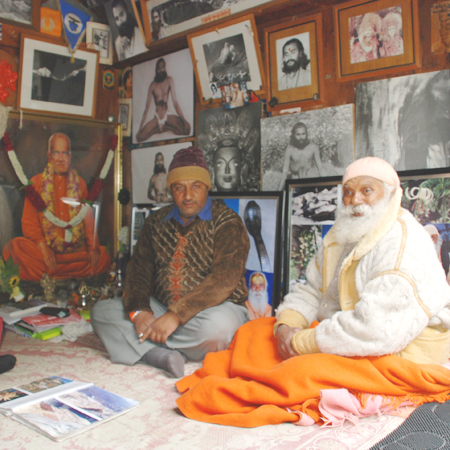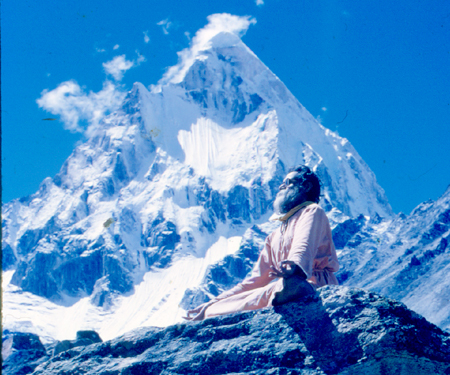 Swami
Sundaranand did a great deal of pioneering work for the ecological conservation of the
Gangotri region. In this connection, his numerous articles and statements appeared nationally.
Full credit went to him for the constitution of Gangotri Development Authority, although he was critical of the
implementation of the development plan. He raised his voice against pollution of the sacred Ganges right at its
source and at holy places like Rishikesh. His old and new photographs documented how irreversible changes had
occurred in the Gangotri region, e.g., the receding of Gomukh to the north,
destruction of forests, extinction of wildlife, and rare Himalayan plant species. He did not think that dams and
reservoirs posed a danger to ecology if constructed with concern for maintaining ecological balance. He felt
that the Ganges, like the mighty Himalayas, was the mother and provider to the people of India. Some projects
dear to him awaited implementation.
Swami
Sundaranand did a great deal of pioneering work for the ecological conservation of the
Gangotri region. In this connection, his numerous articles and statements appeared nationally.
Full credit went to him for the constitution of Gangotri Development Authority, although he was critical of the
implementation of the development plan. He raised his voice against pollution of the sacred Ganges right at its
source and at holy places like Rishikesh. His old and new photographs documented how irreversible changes had
occurred in the Gangotri region, e.g., the receding of Gomukh to the north,
destruction of forests, extinction of wildlife, and rare Himalayan plant species. He did not think that dams and
reservoirs posed a danger to ecology if constructed with concern for maintaining ecological balance. He felt
that the Ganges, like the mighty Himalayas, was the mother and provider to the people of India. Some projects
dear to him awaited implementation.
Among these were his plans for establishing a Himalayan museum and an art gallery at Gangotri, development of Bhagirath Shila area into a nature park for the benefit of pilgrims and tourists who, for some reason, could not go beyond Gangotri. These plans along with their estimated costs were submitted to the Government of India, the Government of Uttar Pradesh, Ministry for Forests and Environment, and the Ganga Development Authority.
The plans included terracing of Gauri Kund. One of the aims of these plans was the removal of encroachments/unauthorized occupation of Bhagirath Shila, hewn by the flowing waters of the river over the millennium, and check ecological degradation of the area. Encroachments had been made by pseudo gurus, sanyasis, and hoteliers for quick and easy money.
Unfortunately, they discharged sewage into the river. Not much success could be achieved, but Swamiji had not lost heart. He said, “Whatever happened was ordained by God man was just an instrument.” A permanent gallery of Swami Sundaranand's representative photographs was established at Gurukul Kangri University, Haridwar. Swamiji was simple and pious, and people came forth to assist him without asking. “It was God's wish,” he said, “my duty was to serve one and all, in the spirit of what Lord Krishna had said in Bhagwad Gita. 'Do thy duty and desire not the fruits of thy work.”

